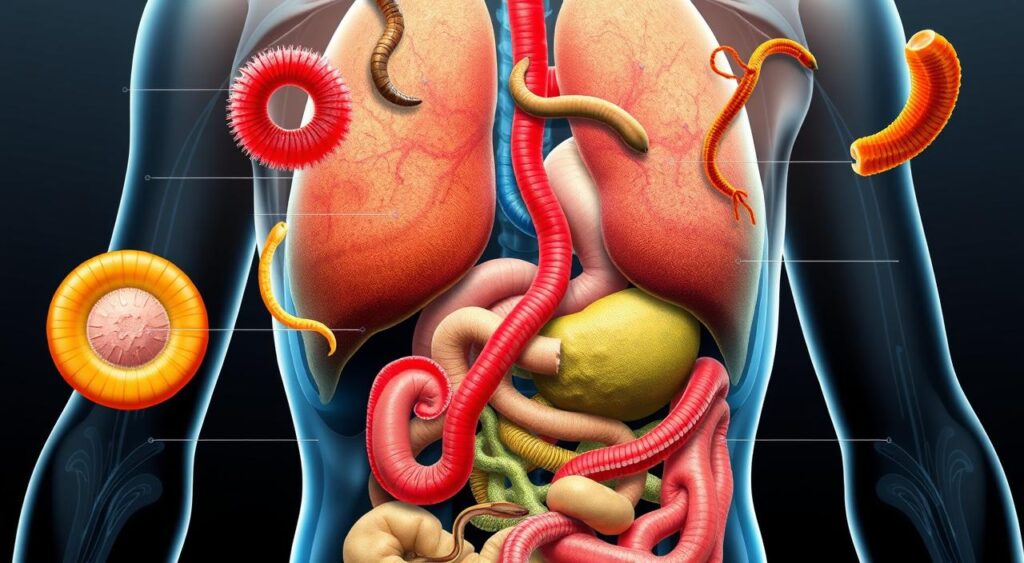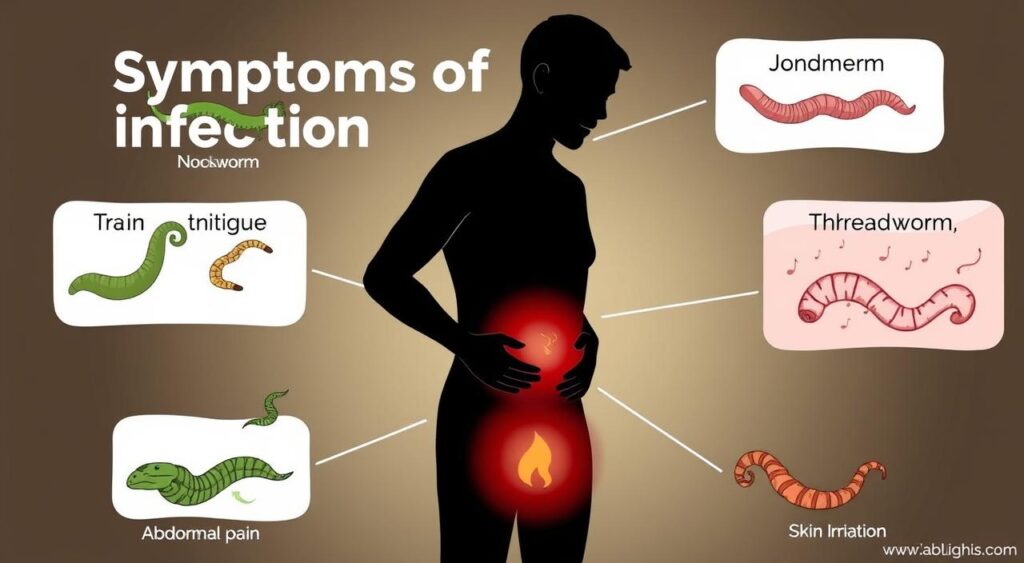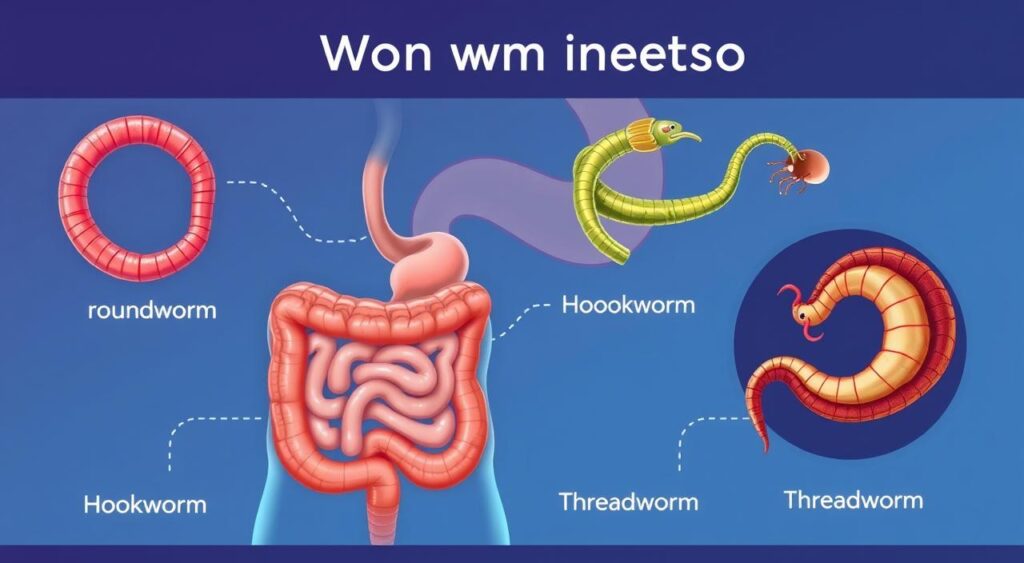Over 1 billion people worldwide suffer from worm infections. These infections can seriously harm human health. It’s vital to know the risks and how to prevent them.

Worm infections come from poor hygiene, contaminated food and water, and not knowing the risks. They can hit anyone, at any age. Knowing the symptoms, causes, and how to prevent them is key to staying safe.
Key Takeaways
- Worm infections affect over 1 billion people worldwide, making them a significant health concern.
- Understanding the different types of worm infections is crucial in preventing and treating them.
- Poor hygiene, contaminated food and water, and lack of awareness are common causes of worm infections.
- Worm infections can affect people of all ages, and it’s essential to be aware of the symptoms and prevention methods.
- Preventing worm infections requires a comprehensive approach, including good hygiene practices, safe food and water handling, and regular health check-ups.
- Early detection and treatment of worm infections are critical in preventing long-term health complications.
- Education and awareness about worm infections are essential in reducing the risk of infection and promoting overall health and well-being.
Understanding Worm Infections
Worm infections are a big problem worldwide, affecting millions. The symptoms of worm infections can change based on the worm type and how bad the infection is. Common symptoms include belly pain, diarrhea, and losing weight.
To diagnose worm infections, doctors use physical checks, medical history, and lab tests. They might do stool, blood, or imaging tests to find worms. Finding and treating infections early is key to avoid bigger problems and stop them from spreading.
Several things help worm infections spread:
- Poor sanitation and hygiene
- Contaminated food and water
- Being close to someone who’s infected
Recent studies show worm infections are a big worry globally. Many cases are not found or treated. It’s crucial to spread the word about worm infection risks and the need for prevention and early treatment.
Knowing about worm infections’ causes and symptoms helps us fight them. We can prevent and control them by keeping clean, avoiding bad food and water, and seeing a doctor if symptoms don’t go away.
Common Types of Parasitic Worms
Parasitic worm infections are a big health worry. Knowing about the different types is key to stopping and treating them. Roundworms, hookworms, and tapeworms are some common ones, each with its own signs and symptoms.
Studies show these infections can really hurt human health, especially where sanitation is poor. Each worm type has its own set of symptoms and treatments. For instance, roundworms often cause belly pain, diarrhea, and weight loss.
Roundworms
Roundworms live in the intestines, lungs, and other organs. They spread through bad food or water. Symptoms include belly pain, diarrhea, and losing weight. Doctors treat them with medicines like albendazole or mebendazole.
Hookworms
Hookworms are another big health risk. They spread through dirty soil or water. They can make you feel sick with belly pain, diarrhea, and anemia. Doctors use medicines like albendazole or mebendazole, and iron to treat anemia.
Tapeworms
Tapeworms live in the intestines and other parts of the body. They spread through bad food or water. Symptoms include belly pain, diarrhea, and losing weight. Doctors treat them with medicines like praziquantel or albendazole, and sometimes surgery.
It’s important to know about roundworms, hookworms, and tapeworms to prevent and treat infections. Recognizing symptoms helps prevent infections. This knowledge is crucial for staying healthy, especially in places where these infections are common.
Risk Factors for Worm Infections
Worm infections are a big worry for public health. Knowing what increases the risk is key to stopping them. Studies have found several main factors that lead to worm infections. These include environmental, behavioral, and geographic factors.
Environmental factors like bad sanitation and hygiene are big players in worm infections. Where sanitation is poor, the chance of getting worms goes up. Eating raw meat or veggies without washing them also raises the risk. Plus, living in places with bad water or pollution can lead to worm infections too.
Environmental Factors
- Poor sanitation and hygiene
- Contaminated water sources
- Inadequate waste management
Behavioral Risk Factors
- Eating undercooked meat or unwashed vegetables
- Not washing hands regularly
- Not using protective gear when handling soil or animals
Knowing these risk factors helps people lower their chance of getting worms. To prevent worm infections, it’s important to practice good hygiene, handle food safely, and be aware of environmental and geographic risks. By doing these things, people can greatly lower their risk of getting infected and stay healthy.
| Risk Factor | Description |
|---|---|
| Environmental Factors | Poor sanitation, contaminated water, inadequate waste management |
| Behavioral Risk Factors | Eating undercooked meat, not washing hands, not using protective gear |
| Geographic Considerations | Living in areas with poor water quality, high levels of pollution |
Signs and Symptoms of Worm Infections
Worm infections can show different symptoms, from mild to severe. It’s important to know the signs to get medical help and treatment. The symptoms depend on the worm type and the person’s health.
Common symptoms include stomach pain, diarrhea, and weight loss. You might also feel fever, tiredness, and weakness. In some cases, worms can affect the brain, causing seizures, headaches, and memory problems.

If symptoms don’t go away or get worse, see a doctor. They can do tests to find out if you have worms. Getting treatment early can stop serious problems and help you feel better.
Gastrointestinal Symptoms
- Abdominal pain
- Diarrhea
- Weight loss
- Nausea and vomiting
Systemic Symptoms
- Fever
- Fatigue
- Weakness
- Loss of appetite
Neurological Symptoms
- Seizures
- Headaches
- Cognitive impairment
- Memory loss
By knowing the signs of worm infections and getting medical help, you can get the right treatment. This can prevent serious health issues in the future.
| Symptom | Description |
|---|---|
| Abdominal pain | Persistent pain in the abdominal region |
| Diarrhea | Frequent and loose bowel movements |
| Fever | Elevated body temperature |
Transmission Methods and Sources
Parasitic worm infections spread in many ways. It’s key to know how they are spread to stop them. Finding out what kind of worm infection you have is the first step to treating it. These infections can come from touching someone who is infected, eating contaminated food or water, or not washing hands well.
Some common ways these infections spread include:
- Direct contact with contaminated soil or feces
- Consuming contaminated food or water
- Poor hygiene and sanitation practices
Food and water can carry worms, especially in places where food isn’t handled well. Water can also spread worms, especially if the water is dirty. Knowing how worms spread helps prevent them and makes sure infections are found and treated right.
To avoid getting worms, keep clean, avoid bad food and water, and make sure places are clean. Testing for worms often helps catch infections early. This makes treatment work better and keeps you from getting sicker.
Diagnosis Methods and Testing
Getting a correct diagnosis is key to treating worm infections. To prevent these infections, it’s important to know how they are diagnosed. There are several ways to find out if you have parasitic worms in your body.
A doctor might suggest a few tests to confirm the diagnosis. These can include stool tests, blood tests, and imaging tests. Stool tests look for worm eggs or larvae in your stool. Blood tests check for specific worm infections by finding antibodies or antigens in your blood.
Stool Tests
Stool tests are a main way to find worm infections. You give a stool sample, and it’s checked under a microscope for worms or eggs.
Blood Tests
Blood tests look for antibodies or antigens in your blood. These signs can show you have a worm infection. They help figure out what kind of worm you have.
Imaging Tests
Imaging tests like X-rays or ultrasounds can show what’s inside your body. They help see if worms have damaged your organs. This info is crucial for treating and preventing future worm infections.
Knowing about different tests helps you prevent worm infections. It also helps you get treatment quickly if you start showing symptoms.
| Test Type | Description |
|---|---|
| Stool Tests | Detect worm eggs or larvae in stool |
| Blood Tests | Detect antibodies or antigens in blood |
| Imaging Tests | Visualize internal organs to detect damage |
Life Cycle of Parasitic Worms
Parasitic worms cause common worm infections. They have a complex life cycle with several stages. Knowing these stages helps in treating and preventing helminth infections.
The life cycle starts when eggs or larvae are swallowed. They then hatch and grow into adult worms. This can happen through contaminated food, water, or soil.
Development Stages
The development stages of parasitic worms include:
- Egg stage: The eggs are ingested and hatch into larvae.
- Larval stage: The larvae develop and mature into adult worms.
- Adult stage: The adult worms reproduce and produce eggs, which are then excreted into the environment.
Host Interaction
Parasitic worms interact with their hosts in various ways. They feed on nutrients and cause tissue damage. This interaction can lead to symptoms ranging from mild to severe.
Research on parasitic worms has improved our understanding of infections. It shows how to prevent and treat them. Healthcare professionals use this knowledge to fight common worm infections and helminth infections.
Treatment Options and Medications
There are many ways to treat worm infections. The main goal is to get rid of the parasites and avoid more problems. A doctor will choose the right medicine based on the worm type and how bad it is.
Preventing worm infections is also key. This can be done by practicing good hygiene, eating well, and seeing a doctor regularly. To treat worm infections well, it’s important to take all the medicine and go to follow-up visits.
Prescription Medications
Doctors often use anthelmintic drugs to treat worm infections. These drugs target the parasites, either killing them or stopping them from growing.
Natural Remedies
Some natural remedies can help prevent worm infections. Eating foods high in fiber, using probiotics, and keeping clean are good examples.
Treatment Duration
The length of treatment for worm infections depends on the type and the medicine used. It’s crucial to finish all the treatment to remove the parasites completely.
Complications of Untreated Infections
Untreated worm infections can cause serious problems in the body. It’s important to know the symptoms early. This way, you can get treatment before things get worse.
Some common problems include:
- Gastrointestinal blockages
- Malabsorption of nutrients
- Systemic inflammation
- Neurological damage
Gastrointestinal Complications
Worms in the digestive tract can cause trouble. Symptoms like abdominal pain and diarrhea can get worse if not treated.
Systemic Complications
When the infection spreads, it can affect other parts of the body. It’s key to diagnose worm infections early. This helps avoid problems in organs like the liver and lungs.
Neurological Complications
In severe cases, worms can harm the nervous system. It’s vital to recognize symptoms and get medical help. This can prevent lasting damage to the brain and nerves.
If symptoms don’t go away or get worse, see a doctor. Early treatment can stop complications and help you recover fully.
| Complication | Symptoms | Treatment |
|---|---|---|
| Gastrointestinal blockages | Abdominal pain, vomiting | Surgery or endoscopy |
| Malabsorption of nutrients | Weight loss, fatigue | Nutritional supplements |
| Systemic inflammation | Fever, joint pain | Anti-inflammatory medication |
| Neurological damage | Seizures, paralysis | Antiparasitic medication |
Prevention Strategies
Preventing worm infections needs a mix of personal hygiene, safe food, and clean environments. Simple habits like washing hands often and throwing away waste properly can help a lot. Studies show these actions are key in stopping worm infections.
Here are some ways to prevent worm infections:
- Wash hands before eating and after using the bathroom
- Cook food well and avoid water that might be contaminated
- Keep living areas clean and dispose of waste correctly
By using these methods, people can lower their chance of getting worm infections. They also help stop these infections from spreading. Learning about prevention is important too. It helps people understand why they need to take steps to stay safe.

Stopping worm infections is a constant effort. It’s important to stay informed and act early to protect yourself and others. By focusing on prevention, we can build a healthier community together.
Special Considerations for Children
Children are more likely to get types of worm infections because their immune systems are still growing. Parasitic worm infections can really harm a child’s health. So, it’s important for parents and caregivers to know the signs and symptoms.
Worm infections can happen in many ways, like through contaminated food, water, and soil. It’s key to prevent infections. Here are some ways to do that:
- Practicing good hygiene, such as washing hands regularly
- Avoiding consumption of undercooked or raw meat
- Staying away from areas with poor sanitation
If a child gets a worm infection, they need to see a doctor right away. The treatment for kids depends on the type and how bad the infection is. A doctor will tell you what to do and what medicine to take.
Studies show that finding and treating worm infections in kids early is very important. By knowing the risks and taking steps to prevent them, parents can keep their kids safe. This way, if an infection happens, kids will get the right care.
Impact on Different Population Groups
Worm infections can hit many groups hard, like kids, older folks, and those with weak immune systems. It’s key to spot the signs early to get help fast.
Children and Infants
Kids and babies are easy targets for worms because their immune systems are still growing. Worms can lead to poor nutrition, diarrhea, and tummy troubles.
Elderly Populations
Older folks are also at risk, especially if their immune system is weak. Worms can make things worse, causing breathing and heart issues.
Immunocompromised Individuals
People with HIV/AIDS or on chemo are super vulnerable to worms. These infections can bring on serious problems for them.

Spotting worm infections early is vital for all groups. This way, we can stop them before they get worse. Knowing how worms affect different people helps us fight them better.
| Population Group | Common Worm Infections | Helminth Infections |
|---|---|---|
| Children and Infants | Malnutrition, diarrhea | Gastrointestinal symptoms |
| Elderly Populations | Respiratory complications | Cardiac complications |
| Immunocompromised Individuals | Severe symptoms | Complications |
Long-term Health Effects
Worm infections can lead to serious health problems if not treated early. It’s important to know the signs of worm infections to get help quickly. Common issues include chronic diarrhea, stomach pain, and losing weight.
Getting a proper diagnosis is key to avoiding long-term health issues. Doctors use stool tests, blood tests, and imaging to find worm infections. Knowing the symptoms helps people get medical help fast, preventing worse problems.
- Gastrointestinal effects, such as malabsorption and intestinal obstruction
- Systemic effects, including anemia and allergic reactions
- Neurological effects, such as seizures and cognitive impairment
Understanding these effects helps people prevent infections and seek help if they notice symptoms.
When to Seek Medical Help
It’s important to know the signs of worm infections to know when to get medical help. Severe symptoms like abdominal pain, vomiting, or bloody stools mean you need to see a doctor right away. Starting treatment early is key to avoid serious problems.
To prevent worm infections, keep your hygiene high. Wash your hands often, especially after using the bathroom or before eating. Also, make sure to cook food well and avoid drinking or eating contaminated things.
Emergency Symptoms
Some worm infections can cause serious symptoms that need quick medical help. These include:
- Severe abdominal pain
- Vomiting blood
- Bloody stools
- Difficulty breathing
Regular Monitoring
Keeping an eye on your health is important when you have a worm infection. You should see your doctor regularly, get stool and blood tests, and follow your treatment plan. This helps get rid of the worms and prevents bigger problems.

Remember, getting medical help is key to managing worm infections. If you have symptoms or worries, talk to your doctor without delay.
| Symptoms | Treatment | Prevention |
|---|---|---|
| Abdominal pain | Antiparasitic medication | Good hygiene |
| Vomiting | Fluid replacement | Cooking food thoroughly |
| Bloody stools | Blood transfusion | Avoiding contaminated water |
Conclusion
Worm infections are a big problem worldwide. They need our attention and action to prevent them. Knowing about different worms, how they spread, and their symptoms helps us stay safe.
Regular health checks, good hygiene, and a healthy diet are key to avoiding worm infections. Keeping up with new ways to diagnose and treat them is also important. This way, we can get help quickly if we need it.
Together, we can fight worm infections and make life better for everyone. Raising awareness and using effective prevention methods are crucial steps forward.
FAQ
Q: What are the different types of worm infections?
A: Common worm infections include roundworms, hookworms, tapeworms, and pinworms. These worms can infect different parts of the body. They cause various symptoms.
Q: What are the symptoms of worm infections?
A: Symptoms of worm infections include abdominal pain, diarrhea, and bloating. You might also feel nauseous, lose weight, and get tired easily. In severe cases, they can cause intestinal blockages, anemia, and neurological problems.
Q: How are worm infections diagnosed?
A: Doctors use stool tests, blood tests, or imaging tests to diagnose worm infections. They may also perform a physical exam and ask about symptoms and exposure. This helps them choose the right test.
Q: How are worm infections treated?
A: Treatment usually involves prescription drugs like anthelmintics to kill the worms. Sometimes, natural remedies or dietary changes are also suggested.
Q: How can worm infections be prevented?
A: To prevent worm infections, practice good hygiene and wash hands often. Cook food well and avoid contaminated soil or water. Clean sanitation and access to clean water are key.
Q: What are the long-term health effects of untreated worm infections?
A: Untreated worm infections can cause malnutrition, anemia, and intestinal blockages. They can also harm the liver, lungs, or nervous system. It’s important to get medical help quickly to avoid these problems.
Q: Are worm infections more common in certain populations?
A: Worm infections can happen to anyone, but they’re more common in children, the elderly, and those with weak immune systems. Location, socioeconomic status, and healthcare access also play a role.
